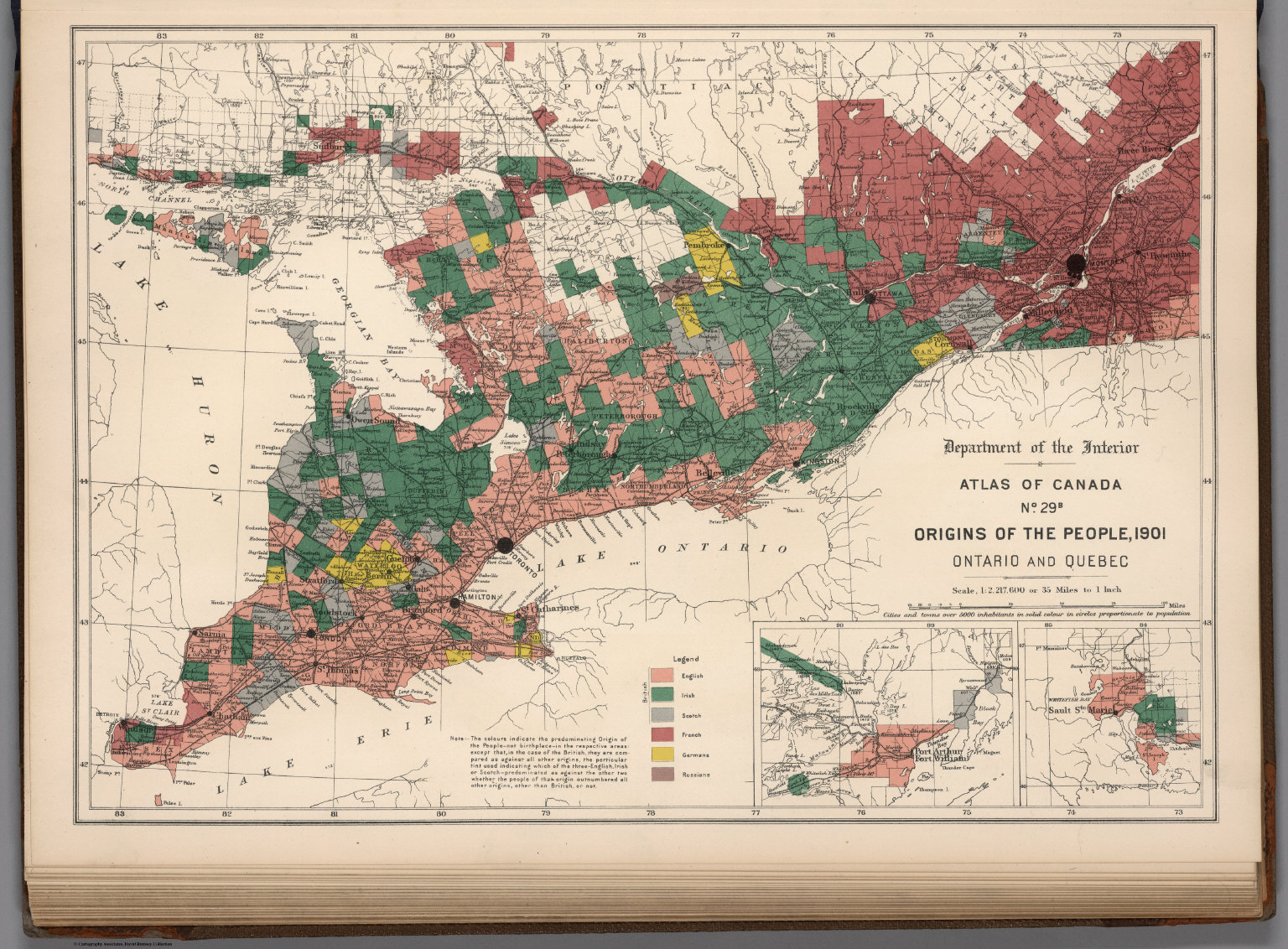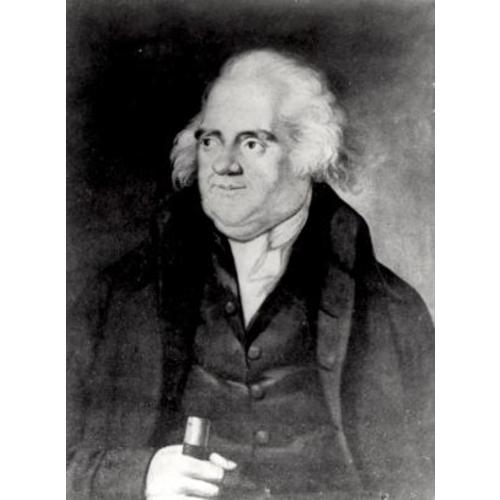Neat map that shows just how Irish rural Ontario became:
Full color, 21 p., 83 plates including maps and diagrams. The Atlas of Canada, first edition published by the Department of the Interior in 1906, was one of the world's first national atlases. A second edition similar in style and content was published in 1915, both editions, featuring thematic...
www.davidrumsey.com
So having re-read through the early history of Upper Canada, I have gained a better understanding of the sources of the original settlers. Virtually all of the original settlers were the families of loyalists, or, in the case of one township, disbanded regulars. The Loyalists were generally those who had fled Upstate New York, particularly the Mohawk Valley, for the Niagara river or Montreal early in the American Revolutionary War. Approximately 1,600 men, totalling about 3,800 people (including just under 100 African slaves) settled on the northwest shore of the St Lawrence river, in the area from modern day Kingston to Cornwall (the eastern extreme of Ontario). Another 800 or so were encamped on either side of the Niagara river.
A majority of the settlers in each community had come from Upstate New York, but there those who had settled in Pennyslvania, New Jersey, Connecticut, Vermont and New Hampshire in reasonable numbers as well, and smattering from virtually every colony north of North Carolina.
It is likely that the preponderance of Mohawk Valley settlers contributed to the Irish nature of the colony, as this are was disproportionately Ulster at the time; however it is known that many Germans from the Mohawk Valley supported their German King, many recently arrived Scottish Highlanders from that area as well, and of course many of English heritage from the other colonies. Based on reviewing the available data, I believe it is likely that less than half of the initial European Loyalist settlement group was of English heritage; at minimum one-quarter were Irish, and perhaps as much as a third.
These settlers joined a few hundred French Canadian farmers on either side of the river at "Des Troits" ("the Narrows").
These would be virtually the only settlers until the area was separated from French administration at Quebec, and John Graves Simcoe was appointed Lt-Governor. He re-formed the Loyalist troop he had commanded during the ARW, the Queen's Rangers, and settled them on land at present-day Toronto, which he had selected to be the site of the colony's new capital, although it wouldn't take this position until the final year of his tenure (1791-1796). The Queen's Rangers and their families totalled about 2,000 people and form the final contingent of the "original" Loyalists.
Simcoe also had a theory, controversial at the time, that most Americans were in fact Loyal, and so he explicitly encouraged American emigration beginning with his administration; subsequent governors were less convinced but could not deny the efficacy of the American frontiersmen.
By 1815, IOTL, the colony's inital 6,600 Loyalists had become around 20,000; they were joined by perhaps 30,000 American "Late Loyalists" and their descendants, and an equal number of settlers from the British Isles and their descendants. Again, by searching through the available records, it appears that less than half of these settlers, even coming from the British Isles, were English ancestry, with again at least one-quarter of the Americans and perhaps more than 40% of the "British" settlers coming from Ireland.
So I'm wondering if we can't find away to appoint not John Graves Simcoe, but Sir Francis Rawdon, Earl of Moira (later Rawdon-Hastings) as the Lt-Governor.

en.wikipedia.org
This would potentially mean settling, in "York", which became Toronto, Sir Francis Rawdon's Loyalist troop, rather than Simcoe's Rangers:

en.wikipedia.org
It appears that the officers of this group were transferred to other commissions in Britain (the Volunteers of Ireland being one of the most succesful Loyalist troops in the ARW); but that would have left roughly 500 soldiers and there families (about 2,000 people) who could be settled by in "Dublin" (which of course could have a different location, and of course Rawdon might not settle them all in one location).
After 1786, Guy Carleton (from Coleraine) is the Governor-General of Quebec, if he appoints Rawdon, who is from Down, as Lt-Governor, it wouldn't take much for one of them to notice the size of the area and perhaps arrive at their naming convention.
ultimately, replacing Simcoe's Queens' Rangers with Rawdon's Volunteers of Ireland (imagine the subtle difference of "Queens' Boulevard" having been named "Ireland Boulevard"!) will certainly have an impact on the initial demographics:
I previously estimated that of the 4,600 loyalist settlers, perhaps 25-33% were Irish; add to this 2000 from the Volunteers of Ireland, and 3,150 to 3,500 of the initial 6,600 European Loyalists would be Irish (there were at least 3,000 Haudenosaunee/Iroquois Loyalists in Upper Canada as well).
Replacing Simcoe would also potentially have the effect of decreasing American immigration; although it would hard to differentiate at the time, and any really determined American settler would likely be able to pass as British - Upper Canada lacks a seaport and so all immigrants at this time come from Montreal or New York State. Even many of the British settlers would take a boat to New York and then overland it to Upper Canada.
But maybe our inital settlement of 6,600 has turned to 20,000 Loyalists, about half of Irish heritage by 1815; 30,000 British settlers of whom around 12,000 are Irish, and a further 15,000 American settlers, with likely at least 3,000 with Irish ancestry and perhaps up to 5,000 creates an 1815 population of around 65,000; 25,000 to 27,000 Irish; or nearing on 40%, which OTL would not be achieved until the era of the famine.
Meanwhile, there are a few other interesting cases, like William Willcocks:
WILLCOCKS, WILLIAM, colonizer, merchant, judge, and office holder; b. January 1735/36, probably in Cork (Republic of Ireland), son of Charles Willcocks and Margaret Russell; m. c. 1760 Phoebe Jackson of Birr (County Offaly), and they had eight children; d. 7 Jan. 1813 in York (Toronto), Upper...
www.biographi.ca
From Cork, (at a time when people of means could obtain title to 150 acres of land by paying the passage and settling on 50 acres a less well-off couple), he sailed from Cork in 1795 with 33 would-be settlers, who promptly abandoned him when he arrived in New York. A second attempt saw his next group of Irish settlers captured at sea by revolutionary France.
The type of thing that is fodder for alternate historians. With just a few things going a bit differently, Willcocks could have been responsible for the first significant wave of Catholic Irish from the southeast of Ireland.
The timing would line up with Jay's Treaty (with Fort Detroit being handed over to the Americans), and so it would make sense to shore up the new frontier with Irish Catholics who would peacefully coexist alongside les Canadiens.



